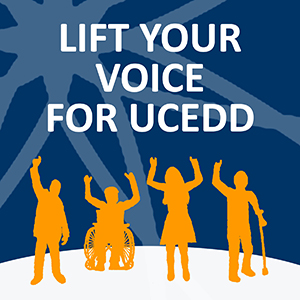UCEDD Funding Alert
March 7, 2018

|
| Download |
|
|
Summary
The President's FY 2019 Budget Request cuts the funding for UCEDDs by $6 million from $39 to $33 million, or more than 15%. In fact, a $5.5 million increase over the expected FY 2018 level is needed to meet the growth of scope of work as related to assisting states to effectively implement recently enacted Federal laws, and the growth of need around autism, Zika, and neonatal abstinence syndrome. UCEDD directors, health professionals, trainees, families, and allies must educate their Members of Congress about why this training program is important, how it serves your state, and why increased funding is needed.
|
FY2015 |
FY2016 | FY2017 | FY18 CR |
AUCD's FY2019 Request |
| $38.0 | $39.0 | $39.0 | $38.0 | $43.5 |
Background
The national network of 67 University Centers for Excellence in Developmental Disabilities (UCEDDs) meets needs of people with disabilities and their families in 56 states and Territories. Their complex needs exist from birth through death; and impact health, education, employment, transportation, housing, accessibility, community integration, caregiving, and more. UCEDDs respond to state and local needs of people with disabilities and their families through coordinated efforts to increase independence, productivity, community inclusion, and self-determination. Unique in their role, UCEDDs do these activities:
- Identify needs of people with disabilities and their families in the state/Territory;
- Conduct research to identify the best practices and interventions to meet those needs;
- Support state and local governments, businesses, schools, non-profits, and others to implement these best practices, interventions, and related policies;
- Develop programs and provide services to people with disabilities and their families;
- Provide continuing education to professionals and other community members on best practices;
- Train undergraduate and graduate students for their future employment in a vast array of fields supporting people with disabilities and their families to meet workforce needs;
- Publish and share their research findings and activities publicly to avoid duplication of efforts.
UCEDDs are funded by the Administration on Intellectual and Developmental Disabilities at $547,000. The requested increase would raise each core grant to $600,000 annually to conduct these activities. This funding would enable the UCEDDs to leverage additional funding from public and private sources to conduct necessary research, service, and training activities, and enable the UCEDDs to coordinate multiple funding streams to meet the complex life-long needs of people with disabilities and their families in ways that result in better health, improved education, and increased employment. This ultimately reduces reliance on social service systems and entitlement programs, and develops citizens' ability to contribute to the economy and federal/state tax base.
Take Action
Use AUCD's Action Center to send an email about the importance of UCEDDs to your Senators and Representative
- Advocacy Letter: http://bit.ly/2G0WsYR
- Educational Letter: http://bit.ly/2G7gOQx
Call your Representative/Senators:
- Dial the Capitol Switchboard at 202-224-3121 and ask for the office of your Representative/Senators
- Ask to speak to the person working on health and disability funding issues
Message: "I am calling Representative/Senator ___________ to urge support of full funding for the University Centers for Excellence in Developmental Disabilities Education, Research and Service (UCEDD) (SAY NAME OF YOUR PROGRAM) in our state. [use talking points below for more] Thank you."
Additional Talking Points
- UCEDDs work in collaboration with other state/Territory agencies to create lasting change to improve lives.
-
- An example is the Children's Freedom Initiative in Georgia where the Institute on Human Development and Disability, the Center on Leadership in Disability (both UCEDDs), the Governor's Council on Developmental Disabilities, The Georgia Advocacy Office, the Statewide Independent Living Council, and People First of Georgia each contributed their unique efforts and expertise to make sure that all children living in hospitals, nursing homes, and other private facilities are supported to live with permanent loving families and that in the future, no child will be institutionalized in the state of Georgia.
-
- Swap with an example from your state
- UCEDDs also contribute to national disability research coordination efforts, such as:
-
- ACL's Interagency Committee on Disability Research;
- GAO's 2017 report on Youth with Autism;
- DOL's Advisory Committee on Increasing Competitive Integrated employment for Individuals with Disabilities; and
- ED, HHS, DOL, and SSA interagency collaboration on Promoting the Readiness of Minors in Supplemental Security Income (PROMISE) program to improve the education and career outcomes of youth with disabilities receiving SSI benefits and their families.
- The federal investment in the UCEDD network results in research-informed policies and practices that decrease federal and state burden of institutional care and long-term services for people with disabilities and their families; increase workforce training and competitive, integrated employment of people with disabilities and the professionals who support them; and coordinate and collaborate across public and private funders and service providers.







